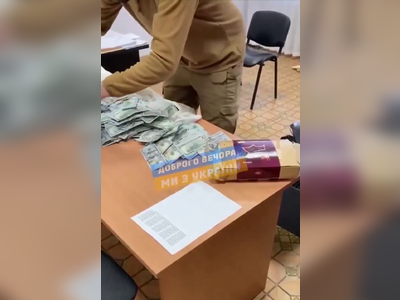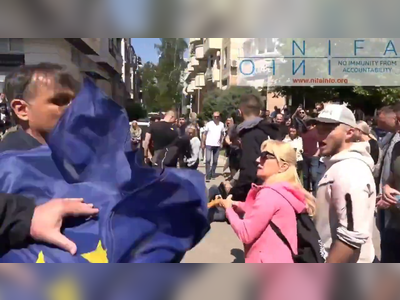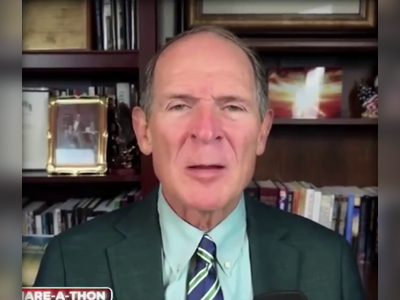German Chancellor Scholz Does Not Anticipate Drastic Reduction in US Aid to Ukraine
Olaf Scholz expresses confidence in continued US support for Ukraine under the Trump administration
BERLIN - German Chancellor Olaf Scholz stated today that he does not foresee a significant decrease in US support for Ukraine with the onset of President Donald Trump's administration.
At a forum organized by the Frankfurter Allgemeine Zeitung, Scholz remarked on Trump's initiative to soon reach an agreement and resolve the conflict, emphasizing that the negotiations, which involve Russian President Vladimir Putin, should not occur without the participation of Ukrainians and Europeans.
Scholz highlighted the aim of these discussions is to resolve the armed conflict in Ukraine instigated by Russia.
Emphasizing that the objective should consider Ukrainian interests, he reiterated, “The goal should be that this does not happen over the heads of Ukrainians and across Europe.”
The Chancellor also discussed internal discussions in Germany concerning an additional financial aid package of three billion euros to Ukraine.
In response to a question by Berthold Kohler, editor of the German newspaper, who moderated the event, regarding his alleged role as a 'brake' on this process, Scholz affirmed that it was his proposal.
He emphasized Germany's commitment to its principles by stating, “The United States is the most powerful democracy in the world and our most powerful ally,” while recalling past expressions regarding the inviolability of borders following statements by Trump about Greenland.
He further added that small countries like Denmark should not be left unaided and insisted on adhering to their principles, as reported by Tanjug.
“Europe isn’t small even now.
If support for Ukraine is demanded worldwide due to the inviolability of borders, the inviolability of borders must prevail globally,” the German Chancellor asserted.
Last week, Scholz declared he would not agree to the three billion euro aid package for Ukraine, which is supported by German Foreign Minister Annalena Baerbock and leaders across the political spectrum, unless it is financed through new borrowing.
Baerbock has repeatedly voiced her concerns over what she perceives as Berlin’s insufficient support for Kyiv, arguing that it is eroding trust among European allies.
She has also criticized past German governments, particularly the administration of Angela Merkel, for ignoring warnings about the Kremlin's aggressive intentions.
Specifically, she criticized the approval of the Nord Stream 2 gas pipeline between Russia and Germany.
Furthermore, Baerbock advocated for increased investment in Germany’s own security, stressing the importance of spending more than 2% of GDP on defense, noting that this figure could approach 3% during crisis years.
At a forum organized by the Frankfurter Allgemeine Zeitung, Scholz remarked on Trump's initiative to soon reach an agreement and resolve the conflict, emphasizing that the negotiations, which involve Russian President Vladimir Putin, should not occur without the participation of Ukrainians and Europeans.
Scholz highlighted the aim of these discussions is to resolve the armed conflict in Ukraine instigated by Russia.
Emphasizing that the objective should consider Ukrainian interests, he reiterated, “The goal should be that this does not happen over the heads of Ukrainians and across Europe.”
The Chancellor also discussed internal discussions in Germany concerning an additional financial aid package of three billion euros to Ukraine.
In response to a question by Berthold Kohler, editor of the German newspaper, who moderated the event, regarding his alleged role as a 'brake' on this process, Scholz affirmed that it was his proposal.
He emphasized Germany's commitment to its principles by stating, “The United States is the most powerful democracy in the world and our most powerful ally,” while recalling past expressions regarding the inviolability of borders following statements by Trump about Greenland.
He further added that small countries like Denmark should not be left unaided and insisted on adhering to their principles, as reported by Tanjug.
“Europe isn’t small even now.
If support for Ukraine is demanded worldwide due to the inviolability of borders, the inviolability of borders must prevail globally,” the German Chancellor asserted.
Last week, Scholz declared he would not agree to the three billion euro aid package for Ukraine, which is supported by German Foreign Minister Annalena Baerbock and leaders across the political spectrum, unless it is financed through new borrowing.
Baerbock has repeatedly voiced her concerns over what she perceives as Berlin’s insufficient support for Kyiv, arguing that it is eroding trust among European allies.
She has also criticized past German governments, particularly the administration of Angela Merkel, for ignoring warnings about the Kremlin's aggressive intentions.
Specifically, she criticized the approval of the Nord Stream 2 gas pipeline between Russia and Germany.
Furthermore, Baerbock advocated for increased investment in Germany’s own security, stressing the importance of spending more than 2% of GDP on defense, noting that this figure could approach 3% during crisis years.
AI Disclaimer: An advanced artificial intelligence (AI) system generated the content of this page on its own. This innovative technology conducts extensive research from a variety of reliable sources, performs rigorous fact-checking and verification, cleans up and balances biased or manipulated content, and presents a minimal factual summary that is just enough yet essential for you to function as an informed and educated citizen. Please keep in mind, however, that this system is an evolving technology, and as a result, the article may contain accidental inaccuracies or errors. We urge you to help us improve our site by reporting any inaccuracies you find using the "Contact Us" link at the bottom of this page. Your helpful feedback helps us improve our system and deliver more precise content. When you find an article of interest here, please look for the full and extensive coverage of this topic in traditional news sources, as they are written by professional journalists that we try to support, not replace. We appreciate your understanding and assistance.











